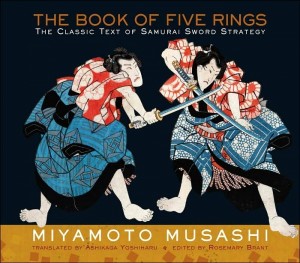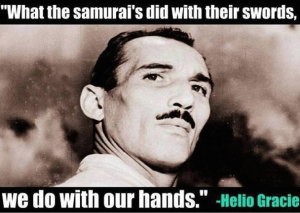Lessons From a 400 Year Old Samurai Swordsmen – Miyamoto Musashi "A Book of Five Rings"
“What the Samurai’s did with their swords, we do with our hands” Helio Gracie
A “Book of Five Rings” written by the swordsman Miyamoto Musashi circa 1645 is a popular book today, not only among martial artists but among business leaders looking for strategic advantages on the corporate battlefield. The book provide an insight to the “Bushido Code” – the philosophy and values of those warriors of feudal Japan – but also the tactics that proved successful in life or death sword fights.
The book provide an insight to the “Bushido Code” – the philosophy and values of those warriors of feudal Japan – but also the tactics that proved successful in life or death sword fights.
Modern day students read in hope that those samurai can provide readers clues to their own development as jiu-jitsu practitioners and martial artists.
Consider the following; my favourite quote from “A Book of Five Rings”:
“The mountain-sea spirit…If the enemy thinks of the mountains, attack like the sea; and if he thinks of the sea, attack like the mountains. You must research this deeply.”
How does this centuries old advice relate to the jiu-jitsu practitioner in the era of smart phones bjj apps and Youtube bjj techniques? Is it even relevant anymore?
Some of the fundamental principles of combat have changed little since the days of sword battles between feudal warlords.
Let us look at a few examples of how to use the Mountain / Sea principle in our jiu-jitsu:
If you are aware that your opponent wants to steer the fight towards a certain position (that is likely their strongest position) then utilize an opposite strategy that forces the opponent to use a position that they are far weaker at.
If you are having a roll with an opponent who is known for their dangerous closed guard you can use a strategy to not allow the opponent to bring the match into their area of strength. You employ a strategy of passing from distance with a standing bull fighter guard pass or you could even choose to jump to guard and forcing them to play top! Your opponent has a speed advantage over you and is using a lot of movement from position to position. By using your grips and being tighter with your controls, you can slow the match down and nullify the speed advantage of the opponent.
Your opponent has a speed advantage over you and is using a lot of movement from position to position. By using your grips and being tighter with your controls, you can slow the match down and nullify the speed advantage of the opponent.
Conversely, if the opponent is stronger and prefers a slower, more static match, by creating scrambles and making the opponent adjust at a faster pace than they are mentally ready for, you may confuse them and get ahead on the positions.
Listen to MMA commentators that identify the strengths of each fighter and observe as the grappler (the mountains) repeatedly takes down his striker (the sea) and never allows him the chance to use his strongest kicks and punches.
Alternatively the striker uses foot work and defensive wrestling (the sea) to force the grappler to use his less potent striking (the mountains)
Employing strategy and tactics to overcome a skilled opponent is higher expression of the art of jiu-jitsu.
Credits: Mark Mullen
GB Black belt from GB Calgary, Canada
Twitter: @MarkMullenBJJ

Comments are closed.